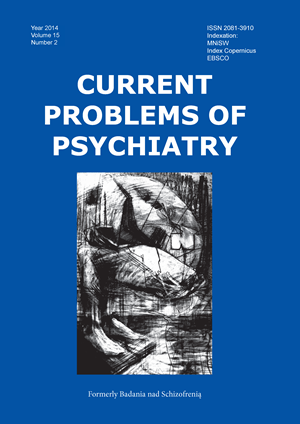Readiness to the treatment and the level of medical knowledgein patients with eating disorders
Keywords:
Eating disorders, motivation for treatment, anorexia, bulimiaAbstract
Background. Early diagnosis of eating disorders and the readiness and motivation of the patient to take medication on the other hand are crucial in the treatment of these behavioral disorders. The aim of this research was to assess the level of knowledge of patients with eating disorders about the etiology, treatment and complications of their disease. The relationships between the level of knowledge and readiness to take medication were analyzed in the study, too.
Material. The study included 99 women with diagnosed eating disorders (33 women with anorexia, 35 with bulimia and 31 with compulsive bingeing) aged between 13 and 39 years.
Methods. The original questionnaire, which included questions about patients’ knowledge concerning the etiology, methods and course of treatment, medical complications of eating disorders was used in the study. Statistical analyzes were performed using the statistical package SPSS 18.
Results. The level of readiness to take treatment in women with anorexia has a positive correlation with the level of knowledge about methods, course of treatment and the medical complications resulting from this disease. We have shown a positive relationship between knowledge of the etiology of bulimia and the methods and course of treatment of this disease. There was no such relationship in case of women with compulsive bingeing.
Conclusions. The results suggest that one needs to implement individual approach to the patients taking into account the need for information about their disease in clinical practice to improve patients’ motivation for treatment of eating disorders.
References
1. Kontić O., Vasiljević N., Trisović M., Jorga J., Lakić A., Gasić M.J. Eating disorders. Srp Arh Celok Lek, 2012; 140(9-10): 673-678.
2. American Psychiatric Association (2013). Diagnostic and Statistical Manual of Mental Disorders (Fifth ed.). Arlington, VA; American Psychiatric Publishing: 2013
3. Roux H., Chapelon E., Godart N. Epidemiology of anorexia nervosa: a review. Encephale, 2013; 39(2): 85-93.
4. Klump K.L., McGue M., Iacono W.G. Age differences in genetic and environmental influences on eating attitudes and behaviors in preadolescent and adolescent female twins. Journal of Abnormal Psychology, 2000; 109: 239-251.
5. Striegel-Moore R.H., Franko D.L. Epidemiology of binge eating disorder. Int J Eat Disord, 2003; 34 (Suppl): S19–S29.
6. Thompson J.K. Handbook of Eating Disorders and Obesity. New Jersey; John Wiley & sons: 2004
7. Maine M., McGilley B.H., Bunnell D.W. Treatment of eating disorders: Bridging the research-practice gap. London; Elsevier Urban & Partner: 2010.
8. Kim Y.R., Son M.H., Nah J.C., Park H.A. Medical findings in women with anorexia nervosa in a korean population. Psychiatry Investig, 2013; 10(2): 101-107.
9. Clausen L., Lübeck M., Jones A. Motivation to change in the eating disorders: A systematic review. Int J Eat Disord, 2013; 11.
10. Scagliusi F.B., Nakagawa K.A., Campos R.M., Kotait M., Fabbri A., Sato P., Cordás T.A. Nutritional knowledge, eating attitudes and chronic dietary restraint among men with eating disorders. Appetite, 2009; 53(3): 446-449.
11. Vansteenkiste M., Soenens B., Vandereycken W. Motivation to change in eating disorder patients: a conceptual clarification on the basis of self-determination theory. Int J Eat Disord, 2005; 37(3): 207-219.
12. Knowles L., Anokhina A., Serpell L. Motivational interventions in the eating disorders: what is the evidence? Int J Eat Disord, 2013; 46(2): 97-107.
13. Brown C.A., Mehler P.S. Medical complications of self-induced vomiting. Eat Disord, 2013; 21(4): 287-294.


